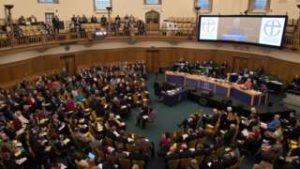Two nights ago, Chris rang me and mentioned the plight of a Christian woman who had been badly let down by a Christian congregation. He asked me to attempt to articulate in a non-technical way how a new Christian might negotiate their way into a healthy relationship with a Christian congregation and its leaders. This is my attempt.
Dear new Christian,
I am delighted that you have recently discovered the Christian faith and have now begun to attend a church near your home. I hope this will be the beginning of a lifetime of growth and spiritual discovery. I trust that you will also have a deep and lasting knowledge of a relationship with God as he reveals himself to us as Father, Son and Holy Spirit.
In sending you my best wishes, I would like to suggest to you that during these early days of your Christian journey you consider three questions. I am commending these questions to you in my deeply-felt concern for vulnerable new Christians such as yourself. I have sadly witnessed occasions when Christian journeys, having begun well, end in tears.
Good experiences as well as bad ones can occur in any kind of church or tradition. In short you have the same opportunity to flourish and grow in a Roman Catholic environment as you do in a conservative Pentecostal church. There are however problems that can and do arise in any kind of church. This letter is an attempt to help you identify and perhaps avoid these problems before they start. There will be little in this letter about theological issues. What I want to focus on especially are matters concerned with style, management and personality, especially as they touch on the leadership of congregations. These can so easily become the cause of shipwreck for a new Christian as they attempt to build up a relationship with God.
The first question I want you to ask yourself is whether you can completely trust your clergyman or minister. This may seem to be a harsh accusatory note with which to start but the opposite fault, of being too trusting and naïve, is potentially very damaging. Because you are new and inexperienced in the faith, your vulnerability to potential abuse is acute. Of course, the minister may be charming and has extensive biblical knowledge, but do you feel that there anything about his/her personality which leaves you feeling uncomfortable? Do you feel that his/her vocation to ministry is in some way affected by ambition rather than a genuine humility before God? Does he/she appear to be preoccupied with self-importance and/or money? If you can make a favourable judgement about your minister, then it should be possible to trust him/her to be alongside you as you travel on your journey of faith. This minister has a great deal of responsibility to promote the life of faith in his congregation. Equally this trusted role can possibly be reversed in such a way that it may destroy all that you have so far learned in your conversion to the Christian faith.
The second question is one that leads out of the first. The church you have started to attend in is one of many thousands in this country. It has its own history and its own way of doing things. The minister will also have a preference for a particular style of theological teaching. This is his entitlement, to choose a tradition in which he/she feels able to articulate the deepest realities of the Christian faith. This taking of one theological tradition as the basis of an overall teaching programme may, however, also have a shadow side. The choice of one tradition may lead a preacher to disdain or reject other approaches. There may even be a decision to declare that these other theological traditions are false, heretical or demonically inspired. You will of course want to feel a community loyalty and initially support the minister in these intolerant prejudices. But the second question needs to be posed at this point. Is it ever right to condemn other Christians because they believe different things from us? Should we ever tolerate harmful and offensive ideas being spewed from pulpit? When Christian charity breaks down in the cause of preserving ‘biblical truth’, something has gone badly wrong. The church concerned has arrived in a dark place. There are many theological positions that I personally find problematic, including a claim that the Bible is inerrant. I also question whether it is helpful always to focus on the death of Jesus as being the part of his life that is to be most preached about. But I will accept that preachers will find their own ways to interpret God for their congregations and who am I to deny them that privilege? Debating theological issues in a civilised way is one thing, but an intemperate decision to declare another group of Christians as demonic is never acceptable. Perhaps it would be time for you to move on.
It seems to be true that there is a great of resentment against those (such as myself) who do not follow the common conservative belief that treats the Scriptures as inerrant. Let me assure you there are large numbers of good Christian people around the world who worship the Christian God without this belief. Most of the mainstream Christian denominations train their clergy in universities and seminaries where such ideas are rare. The study of Scripture, using the tools of historical and linguistic analysis, has been going on in the West for over 200 years. The conclusions from this approach are not always tidy or unanimous but the scholars and teachers wrestle with the text every bit as vigorously as any Bible preacher. If you are ever told by a minister that you are required to believe in the Bible as factually true because this has always been demanded of Christians, be very wary. In a factual sense, the last part of the statement is as bogus as Trumpian news claims. It really is, in this case, ‘fake news’.
The third question that I would like you to ask of your new church is whether you are permitted to grow spiritually as an individual. Many churches obtain their ‘success’ by giving to their members a tremendous sense of group solidarity through music and other means. This use of loud music which seems to be so widespread today, has one striking but baneful effect. It makes it hard to think while it is going on. One of the important messages of Christ was that the individual is a responsible and independent unit. As individuals, we learn to pray, to experience stillness and accept responsibility for our behaviour. We also need to understand sin as well as experience the dynamics of forgiveness for ourselves and others. In whatever setting your new faith is being expressed, I would like to think that you can resonate with ideas of individual flourishing and growth. I hope that such notions accurately describe your new experience of Christian life.
New Christian, perhaps you could hold these three words in your head as you move forward on your Christian journey. To remind you, the first word is trust in your minister. The second is openness to all, especially other Christians, even when they do things in different ways to you. The third is your growth as an individual. Does your church nourish you and meet your needs so that emotionally, spiritually and intellectually you are growing up to be more like Christ? As you will be aware, a negative answer to any of these questions might indicate that you are not in the right place. You have every right to expect your church to help you especially in these early days of faith. The problems you may have identified will probably not go away. They may indeed get worse. As a new Christian I believe you have a right to belong to a congregation who sustains you and helps you grow. Accepting obstacles such as abuse or cultic behaviour is not inevitable. You deserve a spiritual home which will receive you and allow you to flourish at every level. That is why I ask you to ponder these three issues early on in your time as a new member of your church. God bless you on your journey.








